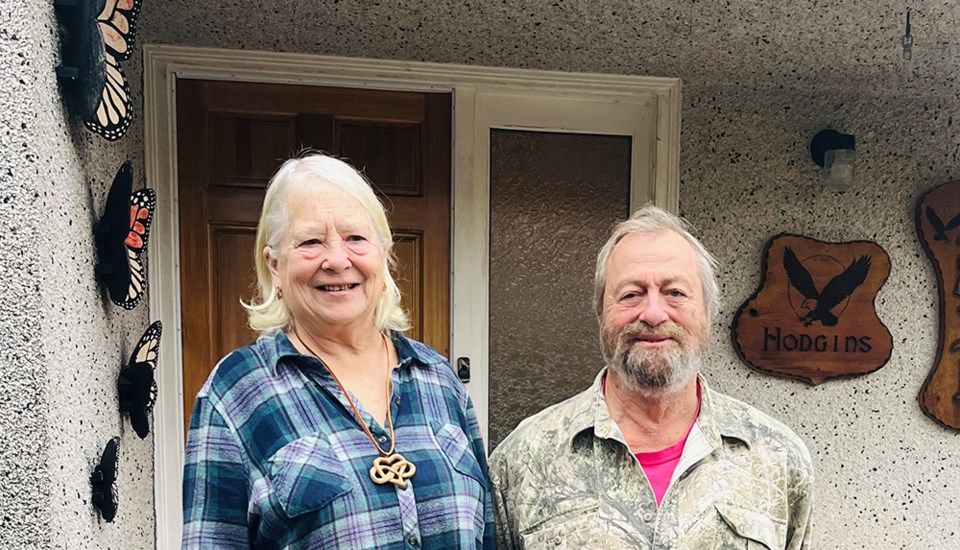Since Dave and Marg Hodgins' son had a stroke at age 39, then again a few years later, the couple has made it their mission to shed light on accessibility, or lack of it, for those who are differently abled, in many qathet region places and spaces. Their son now uses a wheelchair.
Last March, City of Powell River, along with qathet Regional District (qRD) and Powell River Public Library, with input from the public and the Joint Accessibility and Inclusion Advisory Committee, approved the 2024-2026 Accessibility Plan.
Although Dave is vice-president of this committee, he said he hasn't seen much concrete action, including planned funding toward improving access to places such as parks, transit or basic infrastructure.
"Before this happened to our son, we were like everyone else," said Dave. "We didn't think about accessibility, but now we see the lack of it everywhere."
Wheelchair access
The couple said qRD has been a little more responsive to the needs of those who use wheelchairs in parks such as Palm Beach, Shelter Point and Haywire Bay by providing better access to waterfront areas and resurfacing some pathways.
"We're very fortunate," said Dave. "Our son's attitude is phenomenal, he's been resilient through all of these difficulties."
The Hodgins have been advocating for change since 2019, but sometimes feel like it's a losing battle.
Improving accessibility benefits everyone
"We had hoped by now we would have seen some improvements, but we haven't seen the urgency or will to improve services such as HandyDART, bus stop and bus accessibility, or better mobility access to parks," said Dave. "We see the improvements benefiting everyone living here, not just those with disabilities, but for our aging population, mothers with strollers, and even the general public for that matter."
Awareness key to change
Now, the couple is in the process of creating a visual and informational presentation they hope to deliver to community groups, titled: This Region is Not so Accessible, in order to gain momentum and to attract more people to get behind the issue of accessibility.
But what exactly does being accessible mean for a municipality or region of BC?
According to the federal government's Accessible Canada Act (ACA): "The proactive identification, removal and prevention of barriers to accessibility including: employment; the built environment; information and communication technologies; the design and delivery of programs and services; the procurement of goods, services and facilities; and transportation."
In 2022, the province introduced new legislation under the Accessible BC Act, which requires public organizations to create an accessibility committee and plan.
Now that an accessibility plan is in place for the city and the region, what comes next?
According to the couple's draft presentation, to date there are no actions on the part of the city to proceed with.
"They claim to have no budget for it, but yet both the library and regional district have a budget," said Dave. "The city continues to approve projects ignoring the fundamentals of the BC Accessibility Act."
Transportation options limited
Dave said transportation is one of the biggest issues for them. They purchased a used minivan to transport their son to appointments and outings due to the fact that other options are very limited.
"There are no van taxis in town, the Zunga Bus is not wheelchair accessible and the HandyDART has to be booked weeks in advance; 80 per cent are prebooked on a weekly basis, so not great for short notice trips," said Dave.
The couple noted that while all conventional buses are all of the kneeling type (meant for wheelchairs), 80 per cent of existing bus stops are unsuitable to either kneel or load a wheelchair.
Costs for transit, including HandyDART services, are shared by BC Transit, municipal, regional and/or provincial governments.
Dave recently met with the BC Transit representative from Victoria.
"All fares are returned to the city or regional district to reduce their costs," said Dave. "The remainder must come from the local taxpayers, but in the end it is taxpayers who pay for the service."
Park to beach access
One of the surprising places the couple found inaccessible for those in a wheelchair and/or those with mobility issues, are parks around the city.
"I'm not expecting every single park to be accessible to wheelchairs," said Dave, "I'm a realist."
The Peak has reached out to the city for comment and is waiting for a reply.
"Both Willingdon Beach, and Larry Gouthro Park are all grass and they don't have a usable pathway to the beach or bleachers," said Marg. "Most of our focus is trying to bring awareness so there can be some change."
Powell River Community Foundation, of which Dave is president, is organizing a 25-year anniversary event to celebrate charities in the region. The date has been set for June 7, at the Evangelical Church grounds on Manson Avenue. More information will be announced at a later date.
Join the Peak’s email list for the top headlines right in your inbox Monday to Friday.




